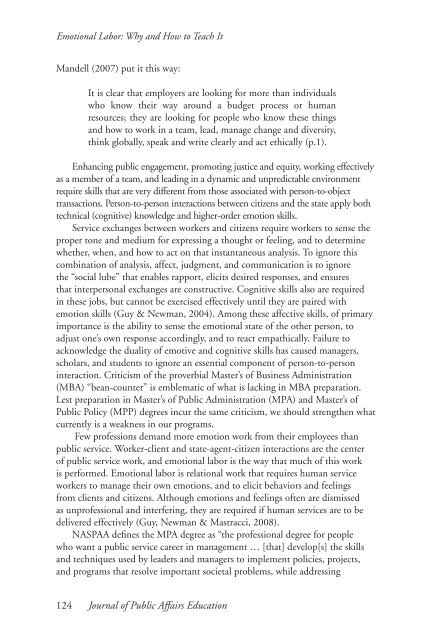JOURNAL OF PUBLIC AFFAIRS EDUCATION - Naspaa
JOURNAL OF PUBLIC AFFAIRS EDUCATION - Naspaa
JOURNAL OF PUBLIC AFFAIRS EDUCATION - Naspaa
Create successful ePaper yourself
Turn your PDF publications into a flip-book with our unique Google optimized e-Paper software.
Emotional Labor: Why and How to Teach ItMandell (2007) put it this way:It is clear that employers are looking for more than individualswho know their way around a budget process or humanresources; they are looking for people who know these thingsand how to work in a team, lead, manage change and diversity,think globally, speak and write clearly and act ethically (p.1).Enhancing public engagement, promoting justice and equity, working effectivelyas a member of a team, and leading in a dynamic and unpredictable environmentrequire skills that are very different from those associated with person-to-objecttransactions. Person-to-person interactions between citizens and the state apply bothtechnical (cognitive) knowledge and higher-order emotion skills.Service exchanges between workers and citizens require workers to sense theproper tone and medium for expressing a thought or feeling, and to determinewhether, when, and how to act on that instantaneous analysis. To ignore thiscombination of analysis, affect, judgment, and communication is to ignorethe “social lube” that enables rapport, elicits desired responses, and ensuresthat interpersonal exchanges are constructive. Cognitive skills also are requiredin these jobs, but cannot be exercised effectively until they are paired withemotion skills (Guy & Newman, 2004). Among these affective skills, of primaryimportance is the ability to sense the emotional state of the other person, toadjust one’s own response accordingly, and to react empathically. Failure toacknowledge the duality of emotive and cognitive skills has caused managers,scholars, and students to ignore an essential component of person-to-personinteraction. Criticism of the proverbial Master’s of Business Administration(MBA) “bean-counter” is emblematic of what is lacking in MBA preparation.Lest preparation in Master’s of Public Administration (MPA) and Master’s ofPublic Policy (MPP) degrees incur the same criticism, we should strengthen whatcurrently is a weakness in our programs.Few professions demand more emotion work from their employees thanpublic service. Worker-client and state-agent-citizen interactions are the centerof public service work, and emotional labor is the way that much of this workis performed. Emotional labor is relational work that requires human serviceworkers to manage their own emotions, and to elicit behaviors and feelingsfrom clients and citizens. Although emotions and feelings often are dismissedas unprofessional and interfering, they are required if human services are to bedelivered effectively (Guy, Newman & Mastracci, 2008).NASPAA defines the MPA degree as “the professional degree for peoplewho want a public service career in management … [that] develop[s] the skillsand techniques used by leaders and managers to implement policies, projects,and programs that resolve important societal problems, while addressing124 Journal of Public Affairs Education
















